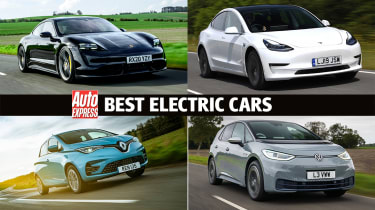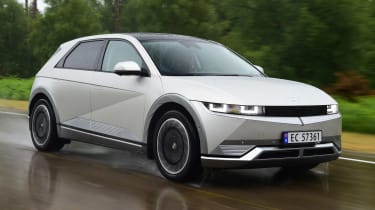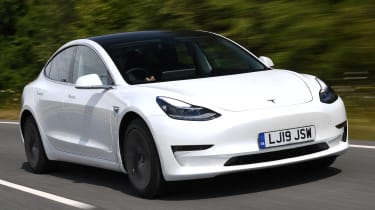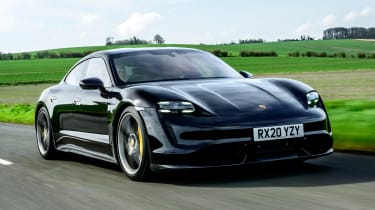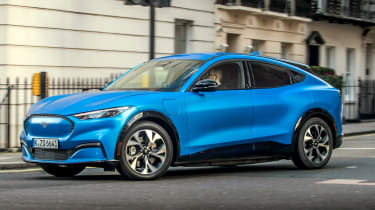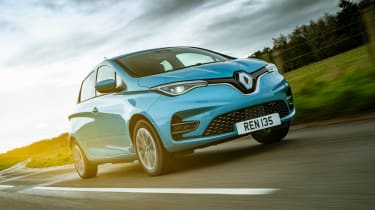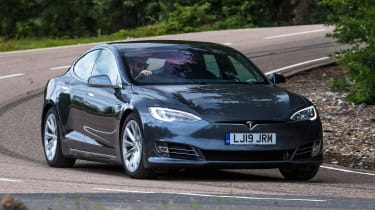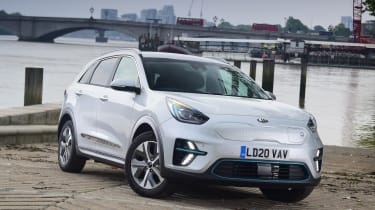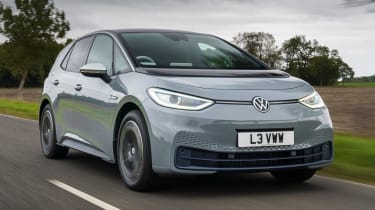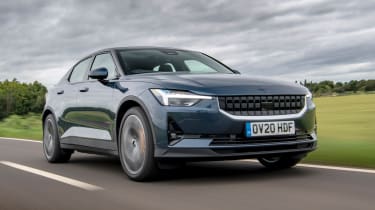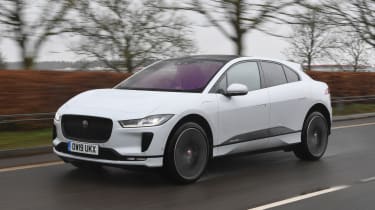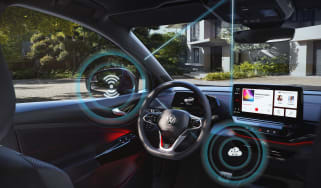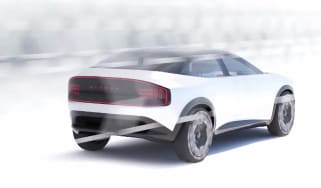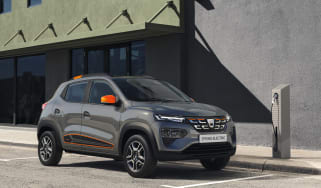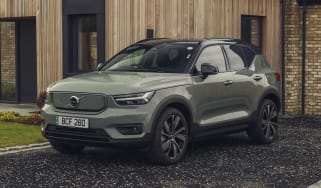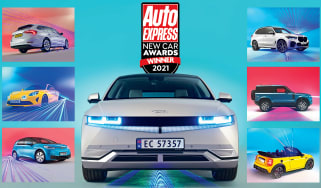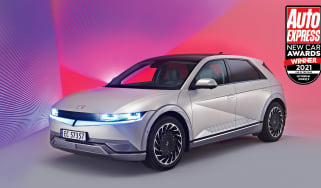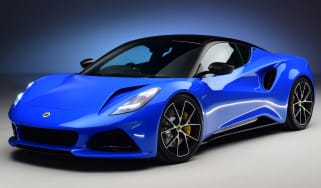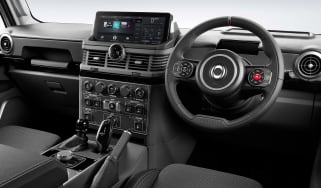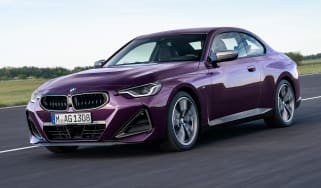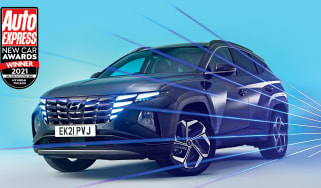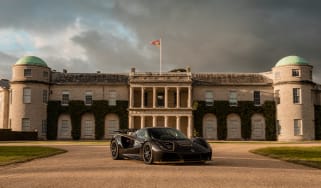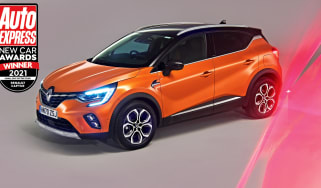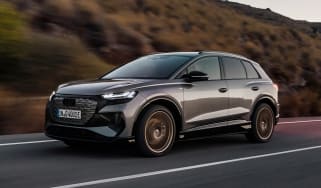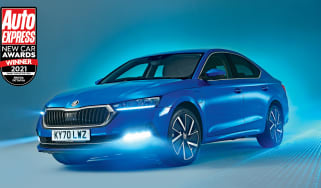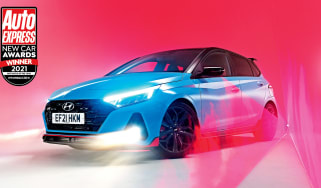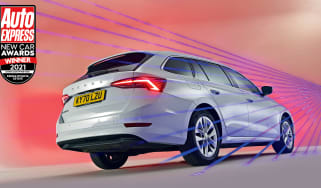Best electric cars to buy 2021
There are more electric cars than ever to choose from, so we've picked some of the best you can buy in the UK now
Pressure is growing on UK motorists to ditch their petrol and diesel-powered vehicles and switch to pure-electric cars, but which are the best electric cars available to buy now on the UK car market?
The number of electric car sales in the UK remains relatively small compared to the fossil-fueled alternatives, but things are changing. The selection of new electric cars facing consumers is growing fast and will continue to do so as more and more manufacturers get on board with the technology - delivering models with longer ranges, faster charging times and lower prices.
At the same time, the electric car-charging infrastructure in the UK is improving, making electric cars more viable for more people. The wider availability of fast and rapid chargers at homes and workplaces, as well as in public spaces, means it's easier than ever to make the swap into a BEV (Battery Electric Vehicle) and enjoy its lower running costs with relatively little inconvenience. Even if you can’t manage with a pure EV, today’s plug-in hybrids offer a good halfway house.
Although some customers might still be a little hesitant about making the switch to electric power, one key advantage is that there is a greater selection than ever before. There are small, supermini-sized EVs like the Peugeot e-2008 and Renault Zoe, Kia's capable e-Niro offering good practicality, while there's also the prestige and pace of models from Tesla, Porsche and newcomer Polestar.
There are other benefits to pure-electric motoring besides the environmental credentials - you’ll be exempt from London’s congestion charge zone and from paying road tax. Electric cars still remain more expensive than their combustion engined counterparts to buy, even with the government’s plug-in car grant, but running costs have been shown to be as much as 60% less for electric cars.
Here we reveal our pick of the current EV options, and give you some top tips that will help you decide whether an electric car is right for you.
- Hyundai Ioniq 5
- Tesla Model 3
- Porsche Taycan
- Ford Mustang Mach-E
- Renault Zoe
- Tesla Model S
- Kia e-Niro
- Volkswagen ID.3
- Polestar 2
- Jaguar I-Pace
Best electric cars to buy 2021
1. Hyundai Ioniq 5
The Ioniq 5 has its sights firmly set on premium rivals such as the Audi Q4 e-tron, Volkswagen ID.4 and Tesla Model Y. Make no mistake, the Ioniq 5 is impressive across the board, showcasing next-gen electric car tech along with capable performance and charging ability normally reserved for high-end models like the Porsche Taycan and Audi e-tron GT.
Two battery options are available with three power outputs: the entry 58kWh battery is paired with a single 168bhp motor driving the rear wheels, delivering a 0-62mph time of 8.5 seconds and a range of 238 miles. The 214bhp mid-spec version offers the best range, with a 73kWh battery increasing the total distance able to be covered on a single charge to 280 miles. The top-spec variant uses the same 73kWh battery, but adds a second motor at the front, giving a combined total of 301bhp and 605Nm of torque. Overall range falls slightly to 267 miles, although performance is much improved with 0-62 taking 5.2 seconds.
Starting at just under £37,000, the Ioniq 5 features a superb infotainment system and generous standard kit, while the available space has to be seen to be believed. It's comfortable, too, so you'll relish the chance of racking up the miles. We certainly did, which is why we named the Hyundai Ioniq 5 our Car of the Year for 2021.
2. Tesla Model 3
The Model 3 was the electric car many had been waiting for. It’s a compact executive saloon rivalling the likes of the Mercedes C-Class and BMW 3 Series – a market with broad mainstream appeal – and it’s also one of the most convincing electric cars that money can buy.
It combines minimalist style, space-age technology, grin-inducing performance, cutting-edge charging tech – supported by the expansive and dedicated Tesla Supercharger network – and, most importantly, a long driving range. The entry-level Standard Range Plus model claims up to 267 miles on a single charge, but it doesn’t sacrifice performance to achieve this. The electric motor drives the rear wheels and powers the car from 0-60mph in 5.3 seconds, while top speed is 140mph.
The interior is nothing like what you’ll find in any BMW or Audi. The minimalist approach might not be to everyone’s taste but you can’t deny the wow factor.
Spend a bit more, and the four-wheel-drive Long Range version has two electric motors and a larger battery for a range of 360 miles, with 0-60mph dropping to 4.2 seconds. Then there’s the Model 3 Performance, which scorches from 0-60mph in 3.1 seconds, but is still capable of 352 miles on a full battery.
3. Porsche Taycan
The new Porsche Taycan is a brilliant car to drive, remaining true to its maker's heritage and leaving you in no doubt that this is a 'proper' Porsche sports saloon.
The Taycan delivers sports car-like handling, with ferocious acceleration and great agility – yet still offers four seats and a usable range. It’s not often that a car comes along that feels truly revolutionary, but that is exactly what the Porsche Taycan is – and it shows how much fun a plug-in future can be.
Despite being a hefty a 2.2-tonnes in weight, it hides its bulk well, and is able to weave neatly through tight corners and demolish fast, sweeping bends. The Taycan's raw pace is, frankly, ridiculous; in 'standard' 523bhp 4S guise it manages the 0-62mph benchmark in 4.0s, although if you upgrade to the 750bhp Turbo S version, it's a staggeringly quick 2.8s.
Don't forget, though, the Taycan should also be pretty easy to live with as a daily driver. Refinement is top notch and, while ride comfort is firm, the air suspension does its job of dealing with the broken, uneven tarmac of UK roads.
The Taycan clearly defines how Porsche sees its own future in the changeover from using fossil fuels to electric power. It's an accomplished first step, splendidly executed and one that should ease the minds of the driving enthusiast.
4. Ford Mustang Mach-E
The Mustang Mach-E is Ford's first all-electric SUV, and is one of the most important cars for the blue oval in a generation. Starting from around £41,000, the Mach-E is a practical and well-priced EV that offers great handling and a generous list of standard kit.
It doesn't compromise on pace, either, with the fastest 346bhp all-wheel-drive version capable of 0-62mph in 5.1 seconds. The model range consists of 68kWh 'Standard Range' battery variants with either rear- or four-wheel-drive. The former offers up to 273 miles of range and the latter 243 miles.
Move up to the 88kWh 'Extended Range' cars and you'll benefit from more miles on a single charge - a claimed 379 miles for the RWD model and 335 miles for the AWD First Edition SUV.
The Mustang Mach-E is nothing like its iconic sports car namesake, but it's a well-crafted electric SUV that still offers a breadth of skills. And, if you're after more pace, then keep an eye out for the 480bhp Mach-E GT performance model due at the end of the year.
5. Renault Zoe
The Zoe shapes up as one of the most convincing small electric cars you can buy. Starting from around £27,000 (after the £3,000 government plug-in car grant), it combines a practical supermini body with a maximum range that outguns key rivals, all for an affordable price.
Thanks to its 52kWh battery, the Zoe offers up to 245 miles of range, which is more than EVs costing much, much more than the Renault. It bolsters this performance with strong charging capability, too, with 50kW rapid-charging technology available, which will allow the Zoe’s battery to be replenished to 80 per cent in as little as an hour and 10 minutes.
Inside, the most recent update to the Zoe has seen the infotainment system from the latest Clio supermini added, so there’s a sense of familiarity and quality to the EV’s interior. Equipment levels are good, while the line-up is broad for an electric model, with three trim levels for buyers to choose from.
The Renault Zoe is an electric car that makes more sense than most of its rivals. Constant updates mean it has benefitted from Renault's latest electric developments, and we'd rate the current model as well worth considering if it can fit into your lifestyle.
6. Tesla Model S
The Model S was arguably the first all-electric car that you could easily use in place of a combustion-engined equivalent when it launched eight years ago. Today, it’s still one of the best EVs around.
The 2020 line-up comprises two high-end models - the Performance and Long Range Plus - both offering great range and useful practicality, to go along with the typically stunning levels of battery-powered performance. If you’re a potential Mercedes S-Class or Porsche Panamera buyer, then the Model S definitely stands out as the electric alternative.
It’s much larger than the Model 3 and is hugely practical, with up to 804 litres of boot space and optional rear-facing child seats, turning it into a seven-seater. The battery and motor technology is what really makes the Model S stand out. With an enormous 100kWh cell, the Model S Long Range is capable of 405 miles on a charge, and is backed up by Tesla’s 150kW Supercharger network.
7. Kia e-Niro
The pace of electric car development is relentless at the moment but the Kia e-Niro remains one of the best electric cars you can buy.
The range starts with the e-Niro ‘2’ at just over £30,000, after factoring in the government’s plug-in car grant - although the range is limited to 180 miles. Using the same electric powertrain as the Hyundai Kona Electric, the e-Niro ‘3’ offers a 282-mile official range that can be had for around £37,000.
There was a big problem with the e-Niro earlier in 2020: getting hold of one. Demand for the pure-electric SUV had outstripped supply, because it’s an electric car that offers enough space for everyday family use, while the top-spec cars have the benefit of a longer driving range. The situation appears much improved now, with increasing numbers of the e-Niro being allocated to dealers.
Kia’s 64kWh battery is among the best in the business, to the point where you can’t fail to be impressed as it nudges down the range in individual miles, instead of being overly optimistic or pessimistic about its reserves.
The styling is a little conservative, perhaps, and the cabin is functional, but fairly uninspiring. Yet these are mere glitches in what has quickly become the best do-it-all EV on the market.
8. Volkswagen ID.3
The Volkswagen ID.3 is a capable, all-electric family hatchback, nailing its brief with keen pricing, desirable looks and superb comfort - all presented in a practical package with a usable, real-world range.
Whereas the latest Golf feels only mildly different to what's gone before, the ID.3 represents a look into VW’s future. Aside from its funky looks, the interior also includes the latest tech, with everything in the ID.3 being touch-sensitive and, pretty much, controlled by the 10-inch touchscreen. The technology is way ahead of say, the Nissan Leaf, which feels very much last-generation by comparison.
The 201bhp ID.3 is good to drive, with a well sorted suspension set-up providing a composed ride, while the quiet electric motor and lack of road and wind noise entering the cabin, just add to the air of refinement.
There shouldn’t be any issue with the ID.3’s range, as the mid-spec 58kWh version should be good for up to 263 miles on a single charge, while Volkswagen claims the top 77kWh variant will go 336 miles before needing to plug-in.
Whichever version you choose to fit your lifestyle, the ID.3 is an outstanding electric car and stands apart from its less-proficient rivals.
9. Polestar 2
With the Tesla Model 3 proving to be a firm favourite with electric saloon buyers, Volvo offshoot Polestar is hoping to offer perhaps the most convincing alternative in the form of the Polestar 2.
This performance saloon features a large 78kWh battery and dual electric motors offering a combined 402bhp. 0-62mph takes just 4.7 seconds, and it goes on to a top speed of 127mph. Crucially, a maximum range of 292 miles means Polestar is the first electric saloon to really stand out as a credible alternative to the Tesla Model 3. It’s capable of recharging at up to 150kW, too, so speedy top-ups are on the cards if you can find a roadside charger capable.
There’s just one model to choose from – currently there are no plans to offer a cheaper version with a smaller battery pack – but there’s a lengthy options list available to personalise the car.
10. Jaguar I-Pace
Jaguar stole a march on its premium rivals when it launched the I-Pace in 2018. With its blend of performance, practicality and premium image, it rightly when on to collect the Auto Express Car of the Year accolade. Two years later, and the likes of Audi and Mercedes still can't match its
Recent software upgrades have boosted the I-Pace’s range to 292 miles, and for 2021 there’s a major overhaul of the car’s infotainment system. It’s now ‘always on’, so it can accept updates without requiring a trip to the dealership.
The basic I-Pace package remains the same, though, so this is a comfortable car with space for four and a decent boot; it could easily take over as your single family car. The best thing about the I-Pace, though, is the way it drives, with stonking performance and excellent handling. In effect it’s everything that an electric Jaguar should be.
How to choose an electric car: top tips
1. Decide whether an electric car will suit your lifestyle
Electric cars are not for everybody. Although the public charging infrastructure in the UK is improving quickly, regular long trips in an electric car can still prove problematic. The perfect usage pattern for an EV involves charging at home overnight when electricity tariffs are lower and not needing to top up the battery again during the day.
Ideally, you’ll need somewhere to charge at home, but you could get around this if there are EV charging points at work or plenty of public charging points nearby. If you do less than 200 or so miles a week, you could get away without having a home or work charger at all; just visit a public one every few days to top up.
If your average daily mileage exceeds the range of your electric car, we’d advise you to think twice, but the occasional longer trip should be perfectly manageable. As the technology improves and the average range of electric cars grows, more and more people will find that they could live quite happily with an electric car.
2. Don’t be put off by high electric car prices, running costs are the key
The list prices of electric cars can look expensive compared to equivalent petrol or diesel models, even when the Government’s plug-in car grant has been applied, but looks are very likely to be deceiving. List prices are just one part of the cost of vehicle ownership and the overall cost becomes much more palatable when you factor-in the relatively low running costs of EVs - often around 60% of those of a similar petrol model depending on usage patterns.
As a general rule, charging an electric car is far cheaper than fueling a petrol or diesel one - even if you use more expensive public charging points.
The free VED (road tax), the company car tax advantages and the lower maintenance costs that result from an EV’s fewer moving parts, and the lower cost of running an electric car will also help offset the higher upfront price.
3. Don’t worry about electric car practicality
There was a time when the majority of electric cars were conventional models with the internal combustion engine powertrain swapped out for an electric motor and batteries. This led to all sorts of compromises in terms of interior and boot space. But today, electric cars tend to built on purpose-designed platforms that are created either purely for electric vehicles or to accommodate various kinds of propulsion system. The end result is that electric cars deliver boot and passenger space equivalent to petrol and diesel rivals.
With everything from superminis and small SUVs to executive saloons and luxury SUVs to choose from, there should be an electric car to meet the needs of most buyers.
4. Enjoy the electric car driving experience
Electric cars tend to be heavier than petrol and diesel models, which means they can feel less nimble on twisty roads, but there are a whole host of benefits to the way they drive that many people will find preferable.
For a start you get near-silent cruising with next-to-no sound from the electric motors. In traffic, the car slows itself when you lift off the throttle, so it’s possible to drive around town using just one pedal, hardly ever touching the brake. It all makes for a very relaxed experience, yet the instant torque provided by the electric motor means that even everyday EVs have the potential to leave a hot hatch standing when pulling away from the traffic lights and in some cases, supercars too.
In some ways, owning an EV means you have to change the way you think about driving. You automatically adopt a gentler, more relaxed style that maximises your range and often means you reach your destination feeling more refreshed than you would do otherwise.
Buying an electric car: frequently asked questions
Are electric cars environmentally friendly?
Electric cars have zero exhaust emissions so they don’t cause the localised NOx and particulate emissions that have a damaging effect on air quality in urban areas. However, the overall environmental credentials of an electric car depend greatly on the source of the electricity used to charge it. As the energy mix of the National Grid moves towards renewable sources like solar, wind and tidal power and away from fossil fuels, electric cars get greener.
Which electric cars have the longest range?
With ever-improving battery technology, electric cars are increasing their ranges. The Kia e-Niro is one of the more affordable EVs and it has an official range of 282 miles, which should be enough for most drivers. The Tesla Model S is the current long range champion however with a 405-mile range.
Are electric cars reliable?
Electric cars are still selling in relatively small numbers and we haven’t seen enough of them doing significant mileages to make a firm judgment on reliability. What we do know is that EVs have fewer moving parts than conventional cars and there’s little evidence from hybrid or electric cars that battery performance degrades substantially with use, although you are likely to see a gradual reduction in capacity.
How much do electric cars cost to tax?
Pure-electric cars are free to tax. This still means you need to go through the process of taxing your electric vehicle although you won’t be required to pay anything. All other cars, including plug-in hybrids, pay at least £140 in road tax.
The UK electric car market: history and future
Electric cars have been around for well over a century but it’s only recently that they’ve started to gain a market foothold. In the early noughties, the Reva G-Wiz led the electric car craze, although that model was hardly a car at all, as it was classed as a quadricycle. It used basic lead-acid batteries, similar to the electric milk floats that once frequented British streets in the early hours, and was slow, cramped and not very safe. It wasn't until the original Nissan Leaf came along that the process of electric car development went into overdrive.
As a five-door, five-seat hatchback, the Leaf offered the practicality of a conventional family car, and became the best-selling EV, albeit with sales figures significantly lower than its petrol and diesel counterparts. Initially the Leaf's range was 80 miles at best, but constant development and improvement have seen that range increase, while the arrival of the Leaf Mk2 in 2018 saw the car gain a range closer to a conventional petrol car.
Seeing the success of the Leaf, rival car makers got in on the act and introduced their own EVs. Hyundai, Kia, Peugeot, Citroen, Renault, Ford and Volkswagen have all joined the electric revolution, while BMW has created its own 'i' EV sub-brand. US firm Tesla has its own huge following with its range of all-electric cars, while prestige makers Audi, BMW, Mercedes and Jaguar are producing their own luxury EVs, and various companies are building low volume all-electric hypercars.
Looking into the future, you can only see the electric car market expanding, and fast. With comprehensive manufacturer buy-in fueled by tightening emissions regulations from governments, electric car technology is improving fast - along with the infrastructure that makes running one easier. You might not be considering an electric car now but it’s a safe bet that you will be in the future.
A good stepping stone to full-EV ownership is a plug-in hybrid model - check out the best plug-in hybrid cars here...
